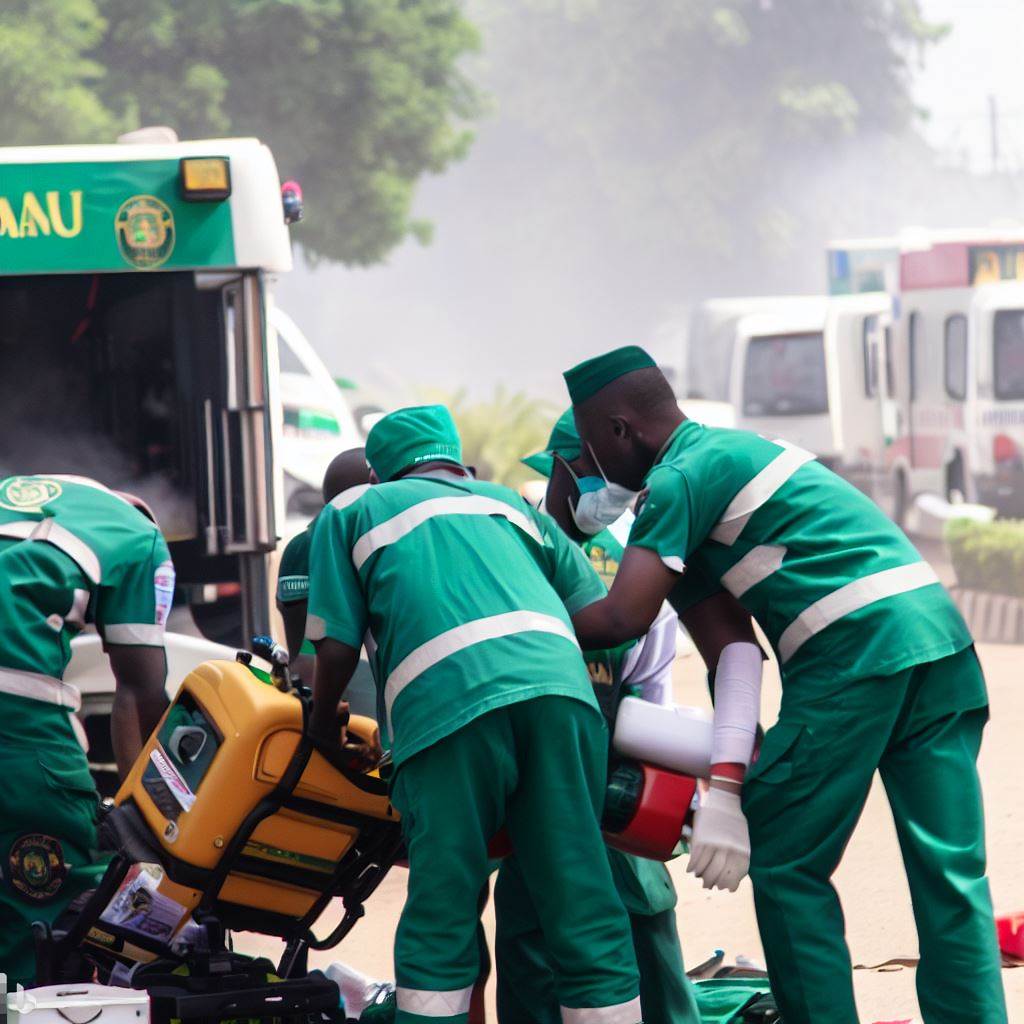Introduction
Nigeria, a country in West Africa, is known for its diverse culture and rich natural resources. However, its healthcare system has numerous challenges that affect the provision of quality medical services.
Paramedics play a crucial role in delivering emergency medical care in Nigeria.
Paramedics are highly trained medical professionals who specialize in providing immediate medical attention to those in critical conditions.
They are skilled in assessing, stabilizing, and transporting patients in need. In a country like Nigeria, where medical emergencies are common, paramedics play a vital role in saving lives.
Challenges faced by Nigeria’s paramedics
Despite their importance, Nigeria’s paramedics encounter several obstacles in the line of duty. First and foremost, there is a lack of proper infrastructure and equipment.
Many medical facilities in remote areas do not have essential resources, such as ambulances and medical supplies, which hinders the paramedics’ ability to respond effectively to emergencies.
Secondly, there are insufficient training and education opportunities for paramedics in Nigeria.
The limited availability of specialized courses and continuous professional development programs hampers the paramedics’ skill development and their ability to keep up with the latest medical practices.
Furthermore, paramedics in Nigeria often face inadequate support from the government.
The lack of funding and recognition for their vital role in the healthcare system leads to low morale and limited motivation among paramedics.
In fact, Nigeria’s healthcare system faces significant challenges, and paramedics play a crucial role in delivering emergency medical services.
However, these dedicated professionals face obstacles such as inadequate infrastructure, limited training opportunities, and lack of government support.
It is essential for the government and stakeholders to address these challenges and provide the necessary resources and support to Nigeria’s paramedics.
Read: The Evolution of Paramedic Services in Nigeria
Overcoming infrastructure and equipment limitations
Paramedics in Nigeria face numerous challenges due to infrastructure and equipment limitations.
However, they have shown great resilience and resourcefulness in finding innovative solutions to overcome these obstacles.
First and foremost, paramedics in Nigeria have had to come up with creative solutions to transport patients due to a lack of ambulances.
Makeshift ambulances, such as modified vehicles or motorcycles, have been utilized to reach patients in need.
These innovative approaches have allowed paramedics to navigate through the often congested and poorly maintained roads, ensuring timely medical assistance.
In addition to limited transportation options, paramedics also encounter difficulties with the availability of medical equipment. In many cases, they have to rely on improvisation and adaptability.
For example, improvised tourniquets, splints made from household items, and even using plastic bags for IV bags have become common practices.
While these solutions may not be ideal, they enable paramedics to provide essential care despite the lack of proper medical equipment.
Recognizing the importance of access to necessary resources, efforts have been made to improve the situation.
Local and international organizations have collaborated to donate medical supplies, including basic equipment like stretchers, oxygen tanks, and bandages.
These donations have greatly enhanced the capabilities of paramedics, allowing them to deliver more comprehensive care to patients.
Furthermore, initiatives have been launched to train paramedics in proper equipment usage and maintenance.
This not only ensures that the limited resources are utilized effectively but also empowers paramedics to troubleshoot and develop innovative solutions on their own.
These training programs have helped paramedics gain critical skills in managing and maintaining equipment, ultimately improving the quality of patient care.
Another significant improvement in infrastructure has been the establishment of specialized medical centers.
These centers are strategically located to provide easy access to medical facilities and emergency services.
With dedicated facilities equipped with state-of-the-art equipment, paramedics can now rely on better resources, enhancing their ability to respond effectively to emergencies.
Despite the challenges, Nigeria’s paramedics continue to demonstrate their dedication and commitment to saving lives.
Their resourcefulness in overcoming infrastructure and equipment limitations is a testament to their unwavering determination to provide essential medical care, even in the face of adversity.
In the end, Nigeria’s paramedics face significant challenges due to infrastructure and equipment limitations. However, their resilience and innovative solutions have allowed them to overcome these obstacles.
From makeshift ambulances to improvised medical equipment, paramedics have found ways to deliver essential care.
Efforts to improve access to necessary resources, such as donations and training programs, have further enhanced their capabilities.
With the establishment of specialized medical centers, paramedics can now rely on better infrastructure, ultimately improving their effectiveness in handling emergencies.
Read: Day in the Life of an Occupational Therapist in Nigeria
Addressing training and education gaps
- Ongoing education vital for paramedics’ competence and adaptability.
- Specialized training programs introduced to boost paramedics’ skills.
- Paramedics’ role expanded beyond conventional medical emergencies.
Importance of ongoing education and skill development
- Continuous education ensures paramedics keep up with medical advancements.
- Regular training sharpens their critical thinking and decision-making abilities.
- Up-to-date knowledge enhances patient care and improves survival rates.
Introduction of specialized training programs for paramedics
- Focused training areas like trauma, pediatric care, and disaster management.
- Paramedics can acquire expertise to handle unique situations efficiently.
- Specializations elevate their status and promote career growth.
Role of international collaborations to enhance knowledge and techniques
- Collaborations offer exposure to diverse medical practices and technologies.
- Paramedics benefit from learning global best practices and evidence-based approaches.
- International partnerships elevate the overall healthcare standards in Nigeria.
In short, Nigeria’s paramedics face significant challenges but are determined to overcome adversities through continuous training and education.
By introducing specialized training programs and fostering international collaborations, these dedicated professionals can stay at the forefront of medical advancements.
Their commitment to ongoing education ensures that they are well-equipped to handle diverse emergencies and deliver exemplary healthcare services to the Nigerian community.
As a nation, supporting and investing in the education and skill development of our paramedics will undoubtedly lead to a healthier and safer future for all.
Read: Nigeria’s Paramedics: An Indispensable Asset in Emergencies
Government support and policy changes
Government support and policy changes are crucial for the advancement of emergency medical services in Nigeria.
Advocacy for improved funding and policies for emergency medical services is essential in Nigeria.
Paramedics and healthcare professionals need adequate resources to provide effective and timely care to patients. Paramedics play a significant role in influencing policy decisions and changes in Nigeria.
Their expertise and experiences can help shape policies that address the specific needs and challenges faced by emergency medical services.
Government interventions have made a positive impact on Nigeria’s emergency medical services.
Through various initiatives, the government has improved infrastructure, increased funding, and implemented training programs for paramedics.
One success story is the establishment of the Lagos State Ambulance Service (LASAMBUS) in Nigeria. This government intervention has significantly improved emergency response and patient care in the state.
Government funding has enabled LASAMBUS to expand its fleet of ambulances, enhance equipment availability, and provide advanced medical training for its paramedics.
This has resulted in faster response times and better outcomes for patients in need of emergency medical attention.
Policy changes have also played a crucial role in enhancing emergency medical services in Nigeria.
For instance, the government implemented the National Health Emergency Act, which dictates standards and protocols for emergency care across the country.
The act requires all healthcare facilities to have a designated emergency department, equipped with trained paramedics and necessary medical equipment.
This has helped improve the overall emergency medical services infrastructure in Nigeria.
In addition to government support, partnerships with international organizations and NGOs have also been instrumental in improving emergency medical services in Nigeria.
These collaborations bring in additional resources, expertise, and training opportunities for paramedics.
Furthermore, government support has led to the establishment of training institutions for paramedics in Nigeria.
These institutions provide both theoretical knowledge and practical training to aspiring paramedics, ensuring a skilled workforce.
However, despite these positive developments, there is still a need for continued government support and policy changes in Nigeria.
Continued funding and policy improvements are necessary to sustain and enhance the progress made so far.
Basically, government support and policy changes are crucial for the advancement of emergency medical services in Nigeria.
Advocacy for improved funding and policies, the role of paramedics in influencing policy decisions, and success stories of government interventions demonstrate the positive impact of such support.
However, more efforts are needed to sustain and further enhance emergency medical services in the country.
Read: Combating Emergency Challenges: Nigerian Paramedics at Work

Stories of Paramedics Overcoming Adversities
Personal anecdotes of paramedics facing difficult situations
In a remote village, a paramedic delivered a baby when the mother had no access to medical facilities. A paramedic bravely saved a child from a car accident, managing to revive them against all odds.
One paramedic faced a violent mob while trying to reach an injured person during a riot. During a natural disaster, a paramedic climbed through debris to rescue a trapped survivor.
A paramedic performed CPR on a drowning victim until help arrived, refusing to give up. In a war zone, a paramedic risked their life to rescue wounded soldiers under heavy gunfire.
Demonstration of dedication, resilience, and bravery
Paramedics work tirelessly, day and night, responding to emergencies regardless of personal risk. They endure harsh weather conditions, dangerous environments, and high-stress situations.
Despite witnessing trauma and tragedy, paramedics remain committed to saving lives. They undergo extensive medical training to ensure they can handle any emergency situation.
Paramedics show remarkable courage, often risking their own safety to help others in need. They handle emotionally challenging situations, providing comfort and support to patients and their families.
Recognition and appreciation for their sacrifices
Paramedics deserve recognition for their selfless acts of bravery and saving countless lives. They often go unnoticed, but their contributions to society are invaluable.
Their dedication and resilience make a significant impact on individuals and communities. It is crucial to appreciate the sacrifices paramedics make to ensure our safety and well-being.
Recognizing their efforts can motivate and inspire others to pursue a career in emergency medical services. We owe a debt of gratitude to these everyday heroes who go above and beyond to serve others.
All in all, the stories of paramedics overcoming adversities highlight their incredible dedication, resilience, and bravery.
These personal anecdotes demonstrate the challenges they face and the sacrifices they make to save lives. It is essential to recognize and appreciate their selfless acts, as they play a crucial role in society.
Paramedics are unsung heroes, deserving of our utmost respect and gratitude. Their stories inspire us and remind us of the importance of compassion and service to others.
Importance of community support
Community support plays a vital role in recognizing and appreciating the work of paramedics in Nigeria.
By encouraging citizens to value and support these dedicated professionals, we can ensure that they receive the recognition they deserve for their crucial role in saving lives.
Awareness is key when it comes to understanding the importance of paramedics in our communities.
By promoting awareness through various initiatives, we can shed light on the incredible work they do on a daily basis.
Here are some ways in which community support can be of immense significance:
- Encouraging citizens to value and support paramedics: It is crucial to highlight the importance of the work these individuals do in providing emergency medical care.
- Promoting awareness of their crucial role in saving lives: By educating the public about the critical functions performed by paramedics, we can foster a sense of appreciation for their efforts.
- Initiatives to honor and appreciate the work of paramedics: Recognizing and acknowledging the dedication and sacrifices made by paramedics can motivate and inspire them to continue their life-saving work.
Community support is essential in creating an environment where paramedics feel valued and appreciated.
When citizens understand the significance of their work, they are more likely to extend their support in various ways.
Organizing events and campaigns to honor paramedics can bring the community together and underscore the importance of their contributions.
It can serve as a platform to express gratitude, acknowledge their heroic efforts, and build a stronger bond between them and the community they serve.
Publish Your Professional Profile, Business or Brand
Showcase your expertise, gain trust, and boost visibility instantly on Professions.ng.
Publish NowCommunities can actively participate in programs aimed at supporting paramedics.
This can include fundraising events, volunteering at local ambulance services, or even just expressing gratitude and support through social media platforms.
When the community stands behind paramedics, it creates a positive and empowering atmosphere for these professionals.
This support not only boosts their morale but also helps in overcoming the adversities they face in the line of duty.
By recognizing the importance of community support and actively promoting it, we can ensure that paramedics continue to serve our communities with utmost dedication and efficiency.
Their work is invaluable, and it is our responsibility to honor and appreciate them for their selfless service.
Let us come together as a community, support our paramedics, and make a positive difference in the lives of those who dedicate their lives to saving ours.
Read: The Role of Exercise Physiology in Nigeria’s Sports Industry
Conclusion
Nigeria’s paramedics face immense challenges in the line of duty. They deal with limited resources, inadequate training, and dangerous working conditions.
However, it is crucial to emphasize the importance of overcoming these adversities for the betterment of emergency medical services in the country.
Paramedics play a vital role in saving lives and providing critical healthcare services during emergencies.
Despite the difficulties they face, they continue to serve selflessly and dedicate themselves to their patients. It is essential to appreciate their resilience and commitment.
To improve emergency medical services in Nigeria, it is imperative for readers to support paramedics. This can be done through advocacy for better funding, resources, and training opportunities.
By voicing our concerns and supporting these healthcare professionals, we can contribute to a more robust healthcare system.
Furthermore, advocating for improvements in the healthcare system is crucial. This includes addressing the shortage of medical personnel, improved infrastructure, and better management of emergencies.
By working together, we can ensure that paramedics have the necessary support and resources to carry out their life-saving duties effectively.
Ultimately, Nigeria’s paramedics face numerous challenges, but their dedication and commitment to their work cannot be underestimated.
Let us rally behind them, support them, and advocate for improvements in the healthcare system to ensure that they can continue to provide the necessary emergency medical services for the betterment of all Nigerians.




